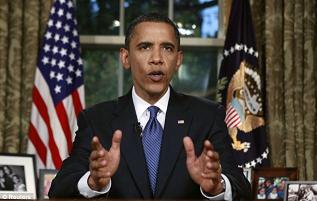The Gulf Oil Disaster Will Not Change U.S. Energy Policy

As is typical with U.S. politicians and media, an extremely serious topic has nearly been reduced to absurdity. Once the urgency of the Gulf oil eruption has been fully sterilized, the stage will be set for business as usual politics — with the corporations comfortably in the driver seat.
But the corporate establishment cannot act too quickly in its fervor to drop the topic.
The environmental destruction brought on by corporate greed has opened the eyes of millions in the U.S. — eyes that are struggling to stay open as they now face the enormous sleep-producing machine of the mainstream media.
One way the media and politicians hypnotize the masses is by spreading the blame, and there are countless ways to do this.
The right-wing media is taking a risky propaganda move by blaming Obama’s “big government” actions against BP, which is painted as the hapless victim of Obama’s “socialism.”
Contrary to the media’s reporting, Obama did not “make” BP set up a $20 billion dollar account to pay for damages; this amount was agreed on behind closed doors for the purposes of calming public anger. BP had to “agree” to the “deal”; and as the Huffington Post reports, “… [Obama] administration officials also acknowledge a negotiation is at play here, and key issues remain unsolved.” (June 16, 2010).
In making its “big government” accusations, the right wing vastly underestimates working peoples’ hatred for giant corporations. As opposed to wishing that the government should take it easier on corporations, workers would like a much tougher response, for once.
How happy would millions of people be if BP’s assets —including those of the top shareholders and executives — were seized to clean up the oil spill and pay workers for their loss of livelihood? This cost will be at least a hundred times what BP “agreed” to pay. How many millions of people living in the U.S. angrily disagreed with Obama when he said: “BP is a strong and viable company and it is in all of our interests that it remain so.”
The media slant of the right wing is not entirely irrational, since it stems from a very real emotion: the fear that working people will demand that corporations be controlled democratically for the purpose of social need, not shareholders’ profit. It is this phobia that will continue to guide the right-wing’s media perspective as the recession grinds on, creating an increased anti-corporate mentality.
And while the right wing poisons the truth about the oil spill by blaming Obama’s “big government,” Obama seeks to minimize BP’s role — and his own — by repeatedly blaming “America’s addiction to oil.” Although it’s true that the U.S. economy is oil dependent, Obama’s ulterior motive here is to disperse blame to everybody in the country, since most people drive cars or use oil-driven transportation. If we are all equally at fault, then nobody is to blame. The current crisis is thus pushed aside, so that “long term solutions” may be discussed instead.
And while long-term energy solutions are desperately needed, they will not come from the U.S. two-party system. Obama’s oval office speech made this clear enough: in response to the largest environmental disaster in the recorded history, one of two “solutions” mentioned by Obama was “higher energy efficiency standards for buildings.” Obama’s cuddling of BP results in part from another kind of investment of this mega-corporation: “The largest beneficiary of campaign donations from BP in the 2008 election cycle, for instance, was President Obama, who took in $77,000 from company executives and its political action committee.” (The New York Times, June 19, 2010).
Obama’s oval office speech did not even mention the Democrat’s stalled energy bill, which includes the highly touted but Wall Street inspired Cap and Trade scheme. Even if the hugely insufficient energy bill did pass, it allots a measly $4 billion in research and development for alternative energy, an amount that will ensure that little progress is made.
An ex-advisor to Bill Clinton, Bill Galston, correctly concluded: “…[Obama’s oval office] speech tacitly sounded the death-knell for the inclusion of serious climate change provisions in any energy bill that Congress might enact this year.”
In fact, a real solution to the U.S. energy crisis was hinted at during Obama’s oval office speech, when he made reference to the U.S. economy’s immense transformation during World War II. His point was that the U.S. economy can change direction drastically to produce certain outcomes, and he’s right. War is definitely a challenge that the corporate establishment is willing to spend massive resources on. During World War II, the entire U.S. economy was directed towards this aim, with factories re-opening to massively produce tanks and bombs.
A similar effort will not be made towards alternative forms of energy. Millions of jobs could easily be created if closed auto plants and other factories were retooled to massively produce solar panels, windmills, energy-efficient windows, high-speed trains, busses, etc.
The Gulf oil catastrophe has not proven to be a large enough disaster to provoke change, proving that nothing will as long as the Democrats and the Republicans are in charge. The U.S. oil and coal addictions will continue to produce masses of pollution and environmental destruction, the likes of which are beginning to challenge the future of humanity.
Since giant corporations constitute an enormous barrier to social progress, it will take the majority of working people to concentrate their energy on removing these obstacles. The first step will be to end all support for the corporate-controlled Democrats and Republicans and work towards creating a political party that is democratically controlled by working people.
Shamus Cooke is a social service worker, trade unionist, and writer for Workers Action (www.workerscompass.org). He can be reached at [email protected]

